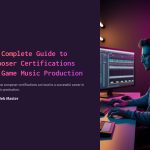 If you’re passionate about music and dream of making a career out of composing, you may be considering obtaining a composer certification. But how does this relate to game music production? This article explores how acquiring a composer certification can pave the way for a successful career in creating game music. Whether you’re aiming to land your first game music gig or develop your skills for larger projects, we’ll guide you through everything you need to know.
If you’re passionate about music and dream of making a career out of composing, you may be considering obtaining a composer certification. But how does this relate to game music production? This article explores how acquiring a composer certification can pave the way for a successful career in creating game music. Whether you’re aiming to land your first game music gig or develop your skills for larger projects, we’ll guide you through everything you need to know.

What is a Composer Certification and Why Is It Important?
A composer certification is a formal acknowledgment that you have completed a certain level of training or experience in music composition. Many institutions and professional organizations offer composer certification programs, each with its own curriculum, structure, and requirements. By obtaining a certification, you demonstrate your technical knowledge, creative abilities, and professional standards to potential clients or employers.
For anyone looking to break into game music production, a composer certification can be an invaluable asset. Game developers often seek composers who have not only the creative skills to write catchy, atmospheric, or immersive music, but also the technical expertise to execute it in a way that suits the needs of the game.

Game Music Production: Understanding the Basics
Game music production is the process of composing, arranging, and recording music specifically for video games. It involves a unique set of challenges compared to traditional music composition, as the music must adapt to the gameplay, enhance the player’s experience, and work seamlessly within the game’s narrative and mechanics.
The primary goal of game music is to evoke emotions, whether it’s excitement, tension, sadness, or joy. Composers often work closely with game designers to ensure that the soundtrack complements the game’s visual and interactive elements. Music in games can be reactive—changing based on the player’s actions—or it can be looped, evolving as the game progresses.

Steps to Becoming a Composer for Video Games
- Learn the Fundamentals of Music Composition
Before diving into game music, it’s essential to master the basics of music composition. Whether you have formal training or learn through online resources, understanding music theory, orchestration, and arrangement is key to becoming a successful composer.
- Get Certified
Consider pursuing a composer certification. Certification programs can provide you with structured learning and equip you with skills that will make you stand out to game studios or independent developers. You’ll gain experience in areas like digital audio production, sound design, and even music licensing.
- Build a Portfolio
Create a portfolio that showcases your ability to compose music for various types of games. This is where your skills are put to the test. Include a variety of compositions—background scores, theme music, and interactive tracks.
- Network with Game Developers
Attend gaming conferences, participate in online forums, and reach out to indie game developers. The game industry is highly collaborative, and knowing the right people can make all the difference. Platforms like SoundCloud and YouTube also allow you to showcase your work to a larger audience.
- Stay Updated with Industry Trends
Game music trends are ever-evolving. It’s crucial to stay updated with the latest software, sound libraries, and techniques used in game music production. Additionally, listening to modern game scores can provide inspiration and insight into the direction the industry is heading.

Tools You Need for Game Music Production
There’s an array of tools available for game music production, ranging from free programs to high-end professional software. Here are some of the most commonly used tools by game music composers:
- Digital Audio Workstations (DAWs): Software like Logic Pro, Ableton Live, or Cubase allows composers to arrange and edit their compositions.
- Virtual Instruments and Plugins: Programs like Kontakt or Omnisphere provide realistic sound libraries for instruments commonly used in game music.
- Game Engines: If you’re working on your own projects, understanding game engines like Unity or Unreal Engine can be incredibly beneficial. These platforms often include tools for integrating your music into the game.

Key Skills You Need to Succeed in Game Music Composition
While technical skills are crucial, emotional and creative skills are what ultimately set successful game composers apart. Some key skills to focus on include:
- Adaptability: Game music must match the tone of the game. Whether it’s a fast-paced action scene or a slow, emotional moment, a composer’s ability to adapt their music to different moods is vital.
- Interactive Music Composition: Unlike traditional music, game music needs to adapt dynamically to the gameplay. Understanding how to create interactive, branching soundtracks that react to a player’s actions is a huge asset in the gaming industry.
- Communication: As a composer, you’ll need to work closely with developers, sound designers, and other team members. Strong communication skills are essential for collaborating effectively.
- Attention to Detail: Game music can be intricate. Composers must pay attention to how their music integrates with gameplay, ensuring there are no audio bugs or jarring transitions.

The Future of Game Music Production: What’s Next?
The game music industry continues to grow, with more games incorporating immersive soundtracks than ever before. As technology advances, there’s increasing demand for highly specialized composers who can work with virtual reality, artificial intelligence, and even procedural music generation.
Additionally, the rise of indie games means more opportunities for composers to collaborate with smaller development teams, giving them greater creative freedom. Whether you’re aiming to compose orchestral scores for AAA titles or atmospheric music for indie games, the future looks bright for talented composers.
Conclusion
Becoming a certified composer and breaking into game music production is a rewarding journey that requires a combination of creativity, technical skills, and industry knowledge. Whether you’re just starting or looking to advance your career, a composer certification can help you stand out in a competitive industry. By understanding the essentials of game music production and continually refining your craft, you can position yourself as a go-to composer for video game projects.
Q&A
Q: Do I need a composer certification to work in game music?
A: While it’s not always required, a composer certification can provide you with a competitive edge. It demonstrates your dedication to your craft and your ability to work professionally in the industry.
Q: How long does it take to become a composer for video games?
A: The time it takes varies, but gaining a certification can take anywhere from a few months to a couple of years depending on the program. Building a portfolio and establishing a network may take additional time.
Final Thoughts
In the world of game music production, every composer’s journey is unique. By obtaining a composer certification and gaining hands-on experience, you’ll open doors to numerous opportunities within the gaming industry. So, start learning, start composing, and most importantly, start playing the game of music production!
*Capturing unauthorized images is prohibited*





